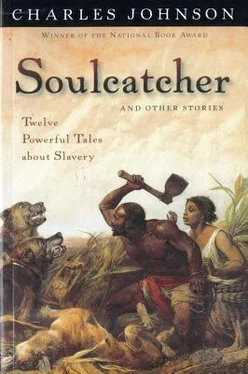He sat bolt upright in bed, the sudden move sending pain through his back. But, no! He must not rest. They were still in bondage, those others, suffering like the slave in George Moses Horton's tragic poem. Waiting for him…
Heaven! in whom can I confide?
Canst thou not for all provide?
Condescend to be my guide
Forever!
With an effort that brought beads of glistening sweat to his forehead, he climbed down from the bed, swinging his feet over the side first, then standing. The room spun. He steadied himself by gripping the ladder-backed chair with his good hand. (Would the injured one, he wondered, ever heal?) His clothes were on the chair. Slowly, he pulled them on with one hand. Given his injuries, dressing took an hour. When he was fully clothed, he padded quietly to the bedroom door, opened it cautiously, and found Hardy just outside the room, where he'd promised to be, but sleeping, his arms crossed over his chest and head tilted forward.
He tipped past him, exited through the house's rear door, and made his way to Hardy's carriage. The horses were still hitched to it, hardly a situation his host would have allowed under normal circumstances, but Lord knew they'd had an extraordinary day in Pendleton. He pulled himself up onto the seat. He took the reins in his left hand, snapped them, and geed the horses out onto the dark road. If he drove through the night and morning surely he would be in Noblesville in time for his next speech: yet another nail driven into slavery's casket. And if his death delivered his loved ones to freedom one day sooner, then so be it. Hardy, he supposed, would be upset when he awakened, discovering him and his horses gone. But this Quaker friend would know where to find him. Possibly he would follow him to Noblesville, arriving just toward the end of his engagement — a little late, as white men fighting oppression often were. And perhaps he would understand why his guest left. If Hardy did not, more's the pity, for, as he drove the horses on through the darkness, he did not have a spare moment to explain. Or to wait for white men — even the good ones — to catch up to him.
And when this transient life shall end,
Oh, may some kind, eternal friend,
Bid me from servitude ascend,
Forever!
ONCE UPON A TIME in a nation not very old the people of a large, northeastern city awoke one morning and discovered to their surprise (though they should have seen it coming) that something had changed in their lives.
The city's Mayor like many others went to sleep the night before, curled beneath the warm covers beside his Wife, feeling as he drifted off to sleep that all was well in the world. Their two children rested comfortably down the hallway in the great, three-story house; they were doing well at their studies, according to the tutor he'd hired for them, and it was likely both boys — then ages eight and twelve — would easily be accepted at the nation's oldest and most prestigious college when the time came for them to apply. His investments were performing better than expected, given the country's delicate political situation (but when, after all, was politics not a delicate matter?). Added to which, he'd worked hard all throughout 1850 to beat his competitors in neighboring cities along the eastern seaboard for a few lucrative contracts that would further industrialize his own city, which would assure his reelection, and he was meeting with representatives of those companies in the morning. Furthermore, his Wife of twenty years seemed pleased with her personal affairs, the charity work she and her friends did each weekend, and particularly with her abolitionist activities. He, being a progressive man, supported fully this cause of Negro manumission, both in his role as Mayor and, even more importantly, in his home, where he employed five free Negroes as servants. Indeed, he had cheered on and publicly supported the recent Compromise that abolished the slave trade in the District of Columbia. He treated his black help royally, or so the Mayor believed, and he overlooked what everyone in his social circle agreed were inherent and unfortunate deficiencies in colored people. These shortcomings, after all, were not their fault, but rather the unjust distribution of talent, beauty, and intelligence by Nature, so that those more generously endowed by Providence were duty bound to help them. Without white men, the Negro would be lost. They were like children in their dependency. The Mayor paid his servants handsomely and on time, was lavish with tips, inquired frequently into their health and well-being, told them repeatedly they were an important part of his family, and he proudly pointed them out when his friends, business associates, and political colleagues dined with his family or dropped by. And, as if that were not enough, the Mayor had a lovely, new mistress — a young singer of thirty (which was half his age), who gave him good reason to look forward to those weekends his Wife and her friends were away.
"Yes, all was well — as well as a civilized man might expect — in the world on Wednesday, January 1, 1851.
Thursday, however, was quite another story. When he opened his eyes and stretched, having slept well — the sleep of the just, he'd say — the Mayor felt as rested as he did on Saturday, the day he normally slept in. But this wasn't the weekend. Or was it? For a moment he wasn't sure. He shook his Wife's shoulder, rousing her awake, and she said, "Why are you still here? Aren't you supposed to be at City Hall?" Like Immanuel Kant, the Mayor preferred his life "to be like the most regular of regular verbs." So he was at first bewildered, then upset, by this disruption of his schedule. He stumbled from bed, his bare feet landing on a floor so cold its chill went through him like a shock, squeezed a whoop from his lips, and sent him hopping around the room for his slippers. He found his wire-rim spectacles on a nightstand, then shivering so badly his teeth chattered, he bent over to better see the small, wooden clock. It was quarter past eleven. He'd slept all morning, missing at least five appointments.
And all the fireplaces were dark and cold.
The Mayor rang for his butler, Henry, who always awoke him and had each fireplace blazing by 5 A.M. No answer. He rang again, waiting and watching his breath steam the bedroom air as if he were standing outside on the ice-cold street. "Please get him to light the fireplaces now! " wailed his Wife. "I'm not leaving this bed until the house is warm! And tell the maid I'm hungry! " The Mayor sighed and said, "Yes, dear, I… I will. Henry must be sick this morning — he's never been remiss in his duties before, you know." He hurried to dress himself, and found to his great dismay that not only had his personal servant foiled to wake him, but Henry had not prepared or set out his clothing for the day either. Because he was so late and had no idea where Henry put his freshly pressed linen, the Mayor grumbled and pulled on his wrinkled shirt from the day before (on the front was a red soup stain from a lunch he'd taken at his club, but he couldn't worry about that now), his uncreased trousers, his coat, then hurried downstairs and through the frigid hallways of his many-roomed house, calling for their servants. Again, there was no answer. In the kitchen, in the chambers set aside for their live-in help, and in the livery stable there was only silence. And not a black face to be found. Moreover, the horses had not been groomed. Or fed. His carriage was not ready. He would have to travel, he realized, the five miles to City Hall under his own locomotion!
Not being accustomed to walking, it took the Mayor two hours to traverse the distance between his home and office. He stopped to rest often, puffing, placing his hand against a wall, his heart racing and empty stomach growling. And what he saw — or rather didn't see — along the way to work startled him. There were no black people. It wasn't as if he looked for them every day. No, most of the time they blended into the background of his city, as unnoticeable as trees or weather vanes or lampposts — or maybe like the inner workings of a finely tuned watch. Obviously, no one paid attention to a timepiece's hidden mechanism until it ceased to work. But now, along the five-mile stretch between his home and City Hall, he saw chaos. Coal had not been delivered to homes, and this was the dead of winter! Barges had not been unloaded in the harbor. Fresh bread had not been delivered from bakeries. Roadwork lay unfinished, as if the fingers of God had plucked its dusky crews off the face of the earth. No windows were washed. No snow was shoveled. It was as if his city had run out of its primary source of power, coal. (A terrible pun, he knew, but on this awful day it seemed appropriate.) He wondered aloud as he galumphed down the nearly empty streets, "What in heaven's name is going on?" No carriages, driven by black coachmen, bore white passengers to and from the offices where they conducted the country's crucial business, domestic and international. Indeed, half the offices he saw were closed.
Читать дальше












